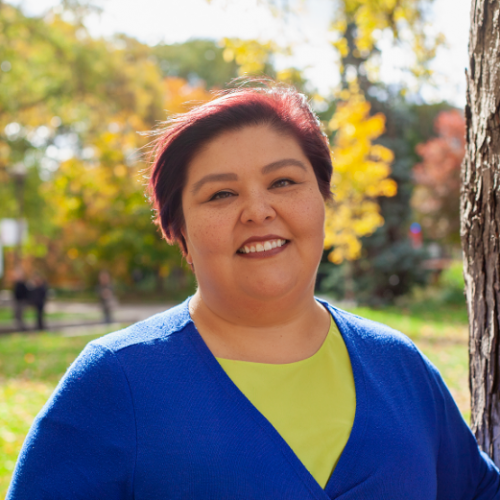Sandi Wemigwase

Sandi Wemigwase
PhD, Social Justice Education
“I am supported by Indigenous faculty and peers in ways that were not possible in previous universities.”
I was born and raised in Michigan and I am a citizen of Little Traverse Bay Bands of Odawa Indians located in Harbor Springs, Michigan. I travel home as often as I can to see my family and friends. I also lived, studied, and worked in Los Angeles for ten years prior to coming to Toronto. I am a full-time student in the Social Justice Education department at the Ontario Institute for Studies in Education pursing my PhD.
I chose UofT because of the Indigenous scholars who teach here. When I decided to pursue my doctoral degree, one of my requirements was to have an Indigenous supervisor. When researching OISE, the opportunity to work with not one, but two different Indigenous education scholars here was an anomaly I had not found in the United States. I am supported by Indigenous faculty and peers in ways that were not possible in previous universities. I’ve had the opportunity to work in two different labs at OISE that have allowed me to make connections with Indigenous folks from all over Turtle Island. Toronto is also a bustling Indigenous scene to be a part of. There are always Indigenous events happening be it music, movies, art, cultural events, and much more.
The Graduate Centre for Academic Communication has been a tremendous resource when it comes to improving my writing and public speaking skills. They offer a variety of workshops to help at every stage of the writing process. Additionally, the OISE library has been instrumental to my success as a graduate student, especially the carefully-curated Indigenous resources.
As an international student, I have relied heavily on the Health and Wellness centre for my medical needs with few hassles. I was able to attend the Native American and Indigenous Studies Association (NAISA) conference every year I have been a graduate student which included visits to Vancouver and New Zealand. This conference is pivotal to my development as an Indigenous scholar because I have made connections with other Indigenous scholars from as far away as Aotearoa. My dedication to this event and its attendees has led to my volunteering for the committee to host NAISA in Toronto in May of 2020.
After graduating, I plan to be a professor and continue my research on post-secondary education and its outreach to Indigenous communities. I also plan to pay forward the careful mentorship I have received while being at student at U of T with my own students.
Students who wish to study Social Justice Education should thoroughly research who they are looking to work with. Use your networks to try and connect with potential supervisors personally and get a feel for who they are and how well their work fits with your research goals. The relationship you build together will need to last years in order for you to be productive and achieve your goals. The availability of supports ensures you are able to complete your program, no matter which issues you may be facing.
At the University of Toronto, I have the ability to engage with other students who are as passionate about social justice as I am. It has been a place of inspiration and growth for not only the issues I care about, but the issues happening to other racialized communities. My professors are intrigued and ask me about my work in a caring way. All of the Indigenous graduate students I have met have simply blown me away with their dedication to their communities and their passion for research. U of T staff are dedicated to the success of their students. St. George campus, located in the heart of downtown, is close to all the things Toronto has to offer. There is not a lack of things to do, things to see, or new food to try. The campus has the city built within and around it, and there is constant contact with the people of Toronto in ways secluded campuses are not.
